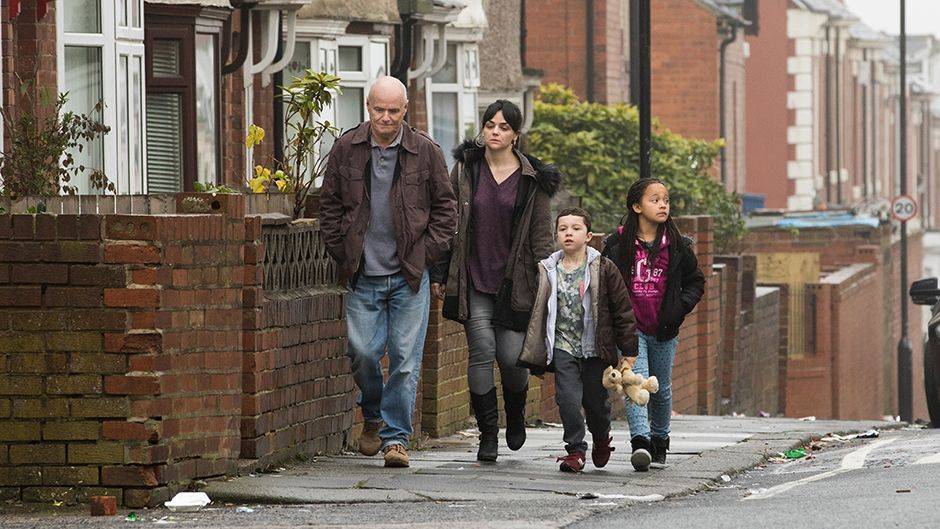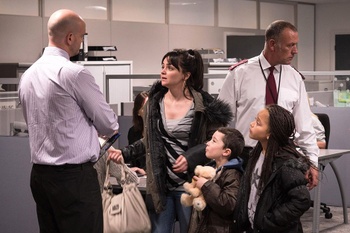Ken Loach has no time for retirement. I, Daniel Blake, a castigating indictment of the neoliberal harassment of people who need assistance, won the octogenarian his second Golden Palm. "The most important thing is that people see the film."

Ken Loach: 'Our instincts are good'
Ken Loach had announced his retirement but couldn't stop himself from directing another film. Just one for the road. And one in the tradition of social-realist gems like Raining Stones. It turned out to be a master stroke. The scandalous story of a handyman who has a heart attack and is refused benefits by institutionalised harassment earned Ken Loach a second Golden Palm.
You won your first Golden Palm ten years ago for The Wind That Shakes the Barley, a historical drama about the Irish struggle for independence. This second Golden Palm seems to be more representative of your work. Were you expecting it?
Ken Loach: Not at all. We honestly had not even expected to be selected for Cannes. Screenwriter Paul Laverty, producer Rebecca O'Brien, and I had agreed that after Jimmy's Hall we were only going to a very precise, tense film that would expose everything that is going wrong. I, Daniel Blake tells a very simple story: direct and unembellished. The shoot took less than five weeks. We were very surprised to win the Golden Palm with such a small film. It is an enormous boost. The glory is very flattering, but the most important thing is that people see the film. Thanks to the Golden Palm, a lot more people will go and see I, Daniel Blake.
Can you prove that Daniel Blake is not the victim of an unfortunate series of coincidences rather than of a system that aims to withhold benefits from as many needy people as possible?
Loach: This is absolutely not an unfortunate incident. The State is a punishing regime for the unemployed, people with disabilities or chronic diseases, and everyone else who needs help. I won't overwhelm you with all the figures, but the evidence is beyond conclusive. Doctors who determine that you are unable to work are contradicted by people who aren't even doctors. The question is why that happens.

Loach: The economic system generates poverty, unemployment, and grave inequality. The State does not want people to realise that and then demand that the system changes. My country has 1.6 million unemployed people and another 5.5 million part-time workers who do not earn enough to live on. If you don't want them to starve, you have to help them financially. The State does everything it can to convince you that your miserable situation is your own fault and is not the result of an inadequate, ideologically delusional system.
They prove that you don't want a job by finding fault with your CV, turning up five minutes late for an appointment, or one of the hundreds of bureaucratic little rules that you have broken as a result of which they have "no choice" but to punish you.
Daniel Blake spontaneously helps a single mother who relies on a food bank and himself receives help from his young neighbours. Can you expect more solidarity from people than from government institutions?
Loach: Unfortunately, yes. The State is supposed to represent the best in people, not the worst. Our instincts are good. People are social beings; we want to be good neighbours. But politicians tailor their policies to the multinationals that support them. It's called neoliberalism. Break down whatever protects and defends workers, weaken the unions, reduce support for people who are in real trouble, and privatise everything. Even education and healthcare are being outsourced to multinationals now.
Greece is being forced to sell everything it owns to repay a debt that it will never be able to repay. And multinationals are preying like vultures on the best pieces.
Research, writing, filming, editing…making a film is a long process. Which stage do you enjoy most?
Loach: The research stage is very interesting. Editing is the nicest period because you only have to start work at nine in the morning, you get a good espresso at ten, and you can go home at four-thirty. That has huge advantages. But filming is certainly the most exciting thing to do, especially because we never shy away from danger. I give everyone plenty of space to contribute. But at the end of every day, you have to finish all the scenes you had planned to complete. If something goes wrong in the morning, you have to work like mad to catch up in the afternoon. That's a huge adrenaline rush.
You don't seem to have any trouble with all that tremendous work. Or are appearances deceiving?
Loach: During filming, you have to get up early and rush around all day. It is exhausting, but I can still manage it. The most tiring thing is that it is the director's responsibility to stimulate everybody to be creative and energetic every single day. You need a lot of nervous energy to make a good film. Without that nervous energy, nothing happens.
Young directors like Andrea Arnold (Fish Tank) and Clio Barnard (The Selfish Giant) were influenced by you, but who did you look up to as a young director?
Loach: I didn't look up to any British directors. The Italian neorealists and a few lesser-known Eastern European directors set me on my path. I loved Andrzej Wajda, who died recently, and the Czech films of the Sixties. I especially liked the work of Milos Forman and Jirí Menzel. I was struck by their rich, warm observation of ordinary people, as well as their refined humour and deep humanity.
The Dardenne brothers are co-producers of I, Daniel Blake. You beat them in the race to the Golden Palm. Does that cause tension between you?
Loach: We are good friends. We speak regularly, and we mostly talk about football. They tell me about Standard Liège. I enjoy their films and I respect their work. Competition does not stand in our way. You don't make films against other people, you make them to share with other people. The Dardenne brothers are on the same team as me. I hope that we can continue to collaborate after England leaves the European Union.
I, Daniel Blake
UK, 2016, dir.: Ken Loach, act.: Dave Johns, Hayley Squires, Sharon Percy, 100 min.
Lees meer over: Film
Fijn dat je wil reageren. Wie reageert, gaat akkoord met onze huisregels. Hoe reageren via Disqus? Een woordje uitleg.